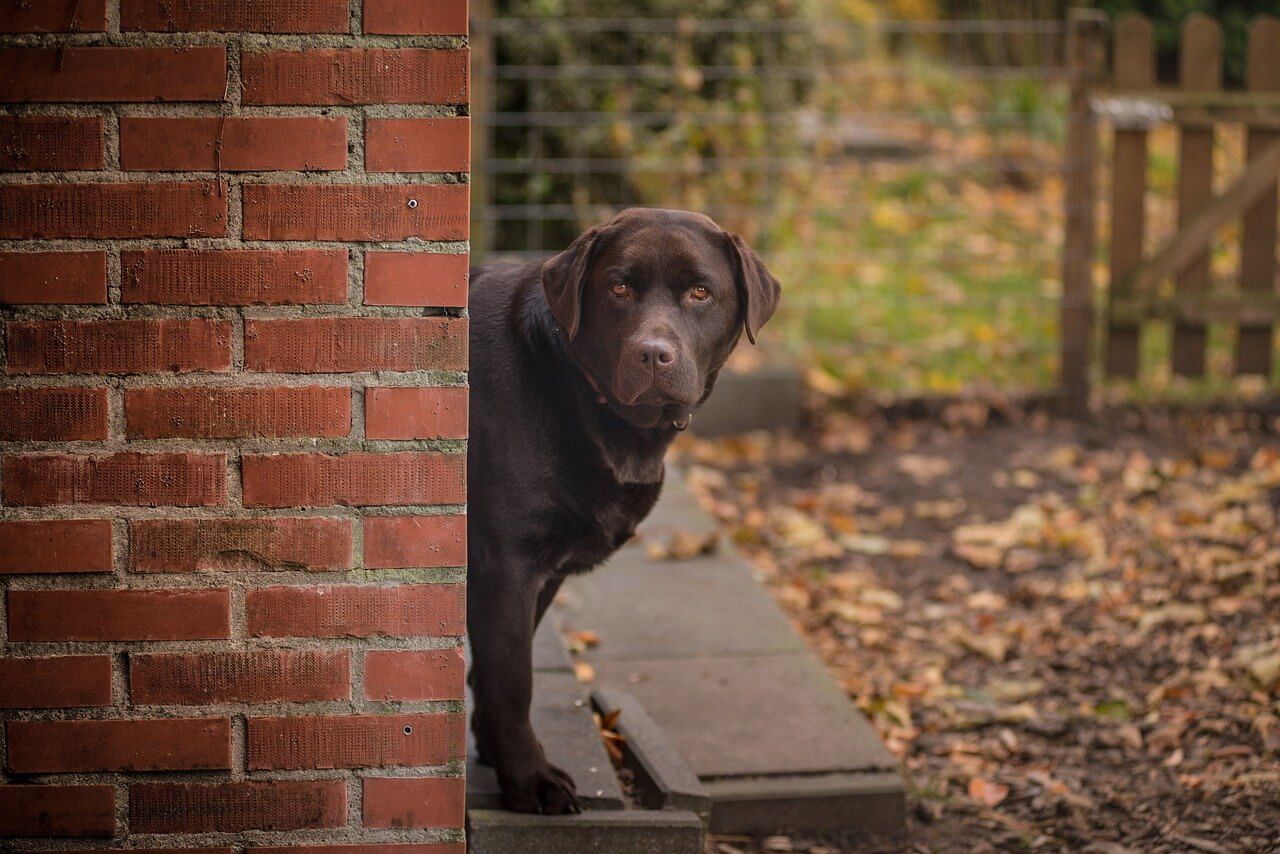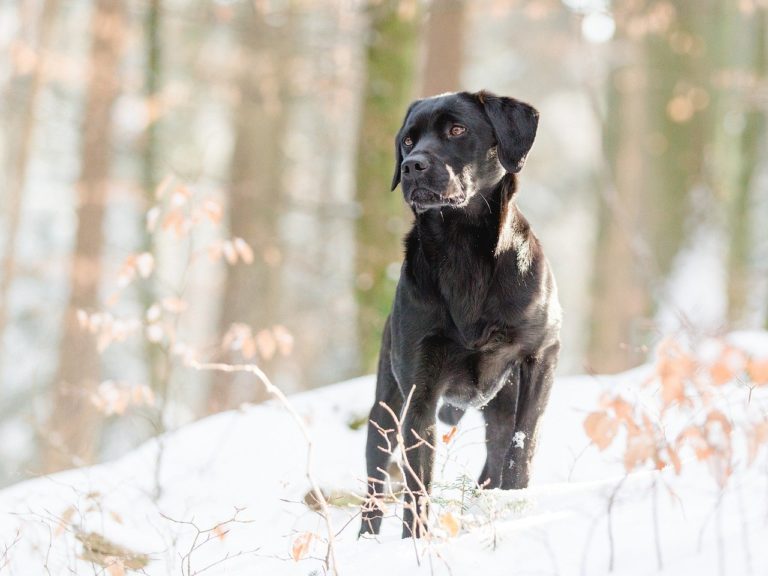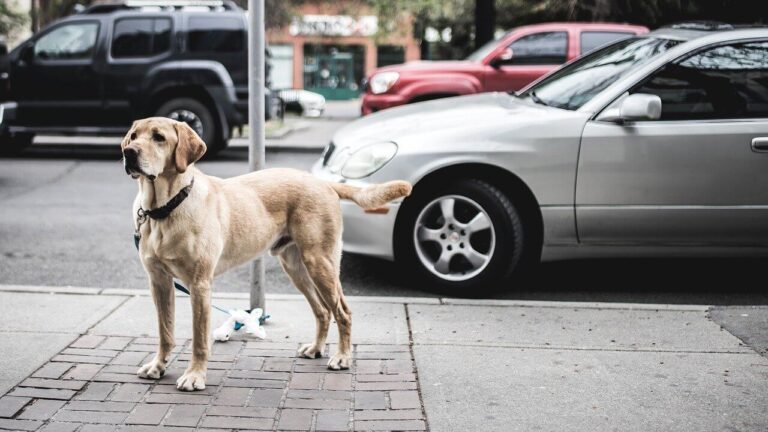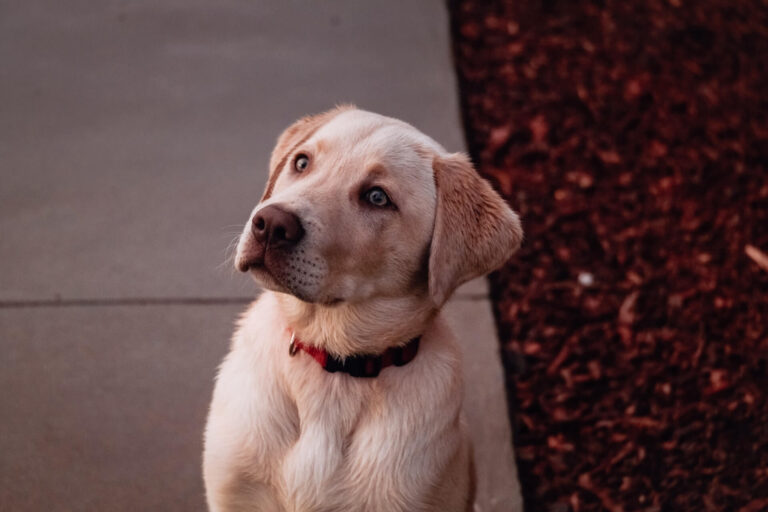Is it possible for a Labrador to be considered a guard dog? And are Labs protective enough that they can be trained to be guard dogs for their owners?
In general, can a Labrador be a guard dog?
If you’re considering a guard dog to be a protective pet that warns you of intruders or alerts you to disturbances around your home environment, then yes, a Lab can possess the traits to perform these duties quite well.
If you’re looking for more of an “aggressive” guard dog that will patrol your property and instigate altercations with people and/or other dogs, you might find the Labrador’s typical personality traits to be too friendly for this type of work.
(This article may contain affiliate links. As an Amazon Associate I earn from qualifying purchases. Learn more)
Let’s look at this subject in more detail.
Can a Labrador Be a Guard Dog?
The Role of a Guard Dog vs. Protective Watchdog
When most people visualize a guard dog, they picture a ferocious attack dog growling and biting anyone that it determines to be a threat. They might picture certain breeds of dogs that have been in the past associated with or bred for protection or guarding behaviors.
In fact, a guard dog is defined by Dictionary.com as “a large, aggressive dog, as a German shepherd or Doberman pinscher, trained to guard persons or property and often to attack or restrain on command.”
However, the definition of a guard dog can be interpreted differently by individual people, and perhaps you’re thinking of a guard dog less as an attack dog, and more as a dog that will live on your property and alert you to intruders, disturbances, or other concerns.
If your intention is to have a dog like this that is protective and can alert you (as more of a watchdog and less of an aggressive attack dog) then Labradors definitely can possess these traits and perform these duties well!
Labs are excellent watchdogs, are large in size with a strong bark, and will alert their owners to sounds in the home, on their property, or in their surrounding environment.
Frequently Labs will alert you to a package being delivered, a car approaching your home, or a person in your driveway before you (or your home cameras) have even detected it yet.
Labs have protective instincts and are usually very bonded to their families, considering even the kids part of the “pack.” Labs can be protective and alert when it comes to keeping an eye on family members and their homes.
Characteristics That Make Labradors Protective Dogs
If you’re new to the world of Labradors, you might be unsure what typical characteristics Labradors are known for.
We have a more detailed breed overview of Labs found here, but Labs have been bred for several hundred years due to their good-natured temperaments, friendliness, bond to people, and trainability.
Labs are intelligent, even-tempered, and generally very friendly dogs. It’s unusual to find a Lab that’s standoffish, disinterested in people, or hostile and aggressive.
These amazing and lovable personalities are a huge part of the reason why Labradors have been the most popular dog breed in the United States for the last 30 years.
Because of this bond to people, friendliness, and loving nature, Labs aren’t usually hostile towards strangers or very aggressive, though they won’t hesitate to alert you if they don’t like something.
Labs can be protective of their pack and people and will respond with barking, growling, or even a raised-fur hackle on their backs when sensing something abnormal in their environment.
We’ve had the gentlest, kindest Labs who almost never bark switch and go into “full protection mode,” and suddenly exhibit the most ferocious, vicious growling and barking when they felt we were threatened by an unknown stranger or something suspicious in our environment.
We’ve had our Labradors respond this way both at home and outdoors in the wild when they detected a bear or other wild animal that was a threat to the area where our family was located.
After reassurances from us though, they switch quickly back to their usual playful nature and friendly selves!

Can a Labrador Be a Guard Dog?
If you’re wanting a dog that is more aloof, suspicious of strangers, and as the definition above states, more likely to attack or subdue a stranger (or on command), a Labrador would not necessarily be a good fit for this type of work.
This is because typically Labs won’t necessarily respond with aggression, even when provoked. They’re usually more jovial, friendly, and very playful.
Much will depend on the exact personality of the dog you choose, and what training you reinforce with your dog.
It will also depend on your bond with your dog and whether you teach them that strangers are meant to be treated with friendliness, or with guarded suspicion.
Labs are not known for being bred to be very territorial, confrontational, or aggressive.
They tend to be very adaptable, so while they may alert you to a problem on your property, they might not have the desire to attack it for you, unless the problem happens to be a bunny, squirrel, or bird!
Otherwise, Labs are more likely to let you know something’s wrong and let you take it from there.
While Labradors do have a bite force of about 230 PSI, which is in the top 20 for all dog breeds, they don’t often utilize it.
Labs were bred to be retrievers and hunting dogs for upland game and waterfowl, and continue to be bred for such traits. Labs are trained to use a “soft mouth” in retrieving, in order not to damage what they are bringing back to their human.
A dog with a hard mouth and strong bite reaction would destroy the wild game they were retrieving in their mouths. While any dog can bite, you’re more likely to have a Lab be too gentle with whatever they have in their mouths than too firm.
Labs as Professional Guard and Working Dogs
Labradors in the professional working world are often not used as aggressive guard dogs or as “bite dogs.” Labradors are more likely to be used in detection work, such as arson dogs, explosives dogs, or drug-sniffing dogs.
You might see other types of dogs used in police work for more aggressive training, including Belgian Malinois and German Shepherds.
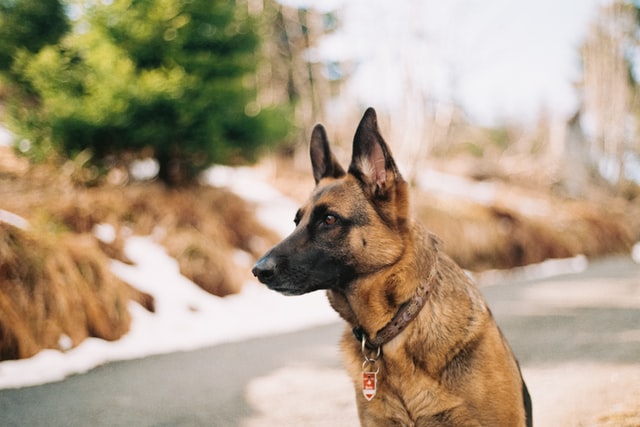
Labs have excellent noses for detection work but are more likely to be used for friendly sniffing rather than more aggressive types of work.
Labradors are often used as service dogs and are one of the main dog breeds used in agencies such as Guide Dogs for the Blind.
Because of their friendly and kind personalities, Labs are more suited to service work and less to types of environments where aggression would be valued.
Can You Train Your Lab to Be a Guard Dog?
As discussed, Labs won’t necessarily be the best choice if you’re looking for a dog that behaves like the technical definition of a guard dog, such as attacking on command.
However, you can definitely encourage your Labrador to engage their protective instincts and reward them for alerting you and being a great watchdog around your home.
The individual personality of your particular dog will affect how serious your Lab takes their job as the family watchdog, but you can reward your dog for alerting you and performing those duties that you want to encourage.
Reward your Lab for alerting you to things in your environment that they detect, such as someone at the door, on your property, or something else they notice that might be different (even if it’s a plastic bag flying through the air)!
Don’t scold or punish your Lab for barking when the doorbell rings, or alerting you to sounds in their environment that they might be concerned about.
You don’t have to praise them excessively or make a huge deal about it, but don’t give them a negative association with trying to protect you, if you want to encourage them to be a great watchdog.
If your Labrador gets scolded repeatedly for trying to alert you, they will eventually become fearful of your reaction when trying to respond.
They’ll then be less likely to alert you to something you might have wanted to know about.
Also, if you feel your Lab is barking excessively, for reasons that aren’t related to protectiveness but are more a nuisance issue, check out our guide to Labrador barking that has some easy training techniques to help.
Summary – Is a Lab a Good Guard Dog?
Labs can be excellent watchdogs and naturally able to alert their owners to unusual things in their environments. But in the typical sense of being an aggressive guard dog, a Lab wouldn’t be the first choice for such work.
Labradors’ friendly personalities, playful natures, and overall happy temperaments make them wonderful members of the family, but less likely to react with hostility and aggression towards strangers.
Still, it all depends on the temperament of your individual dog, and how much training you put in with your dog to reinforce or extinguish certain behaviors you want your dog to demonstrate.
For more resources on Labrador training, check out our Tips & Training resources to help you succeed with your dog!

